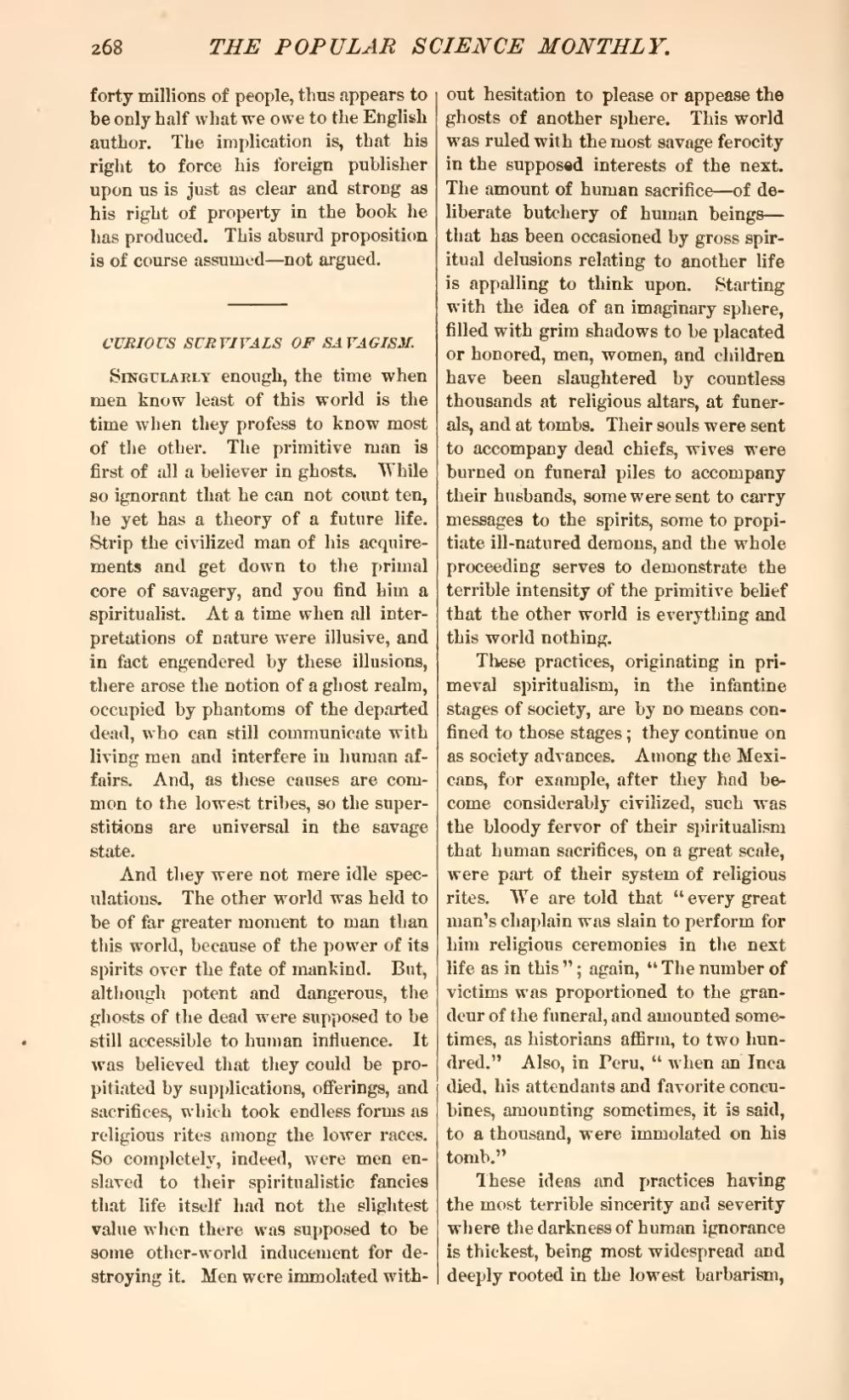forty millions of people, thus appears to be only half what we owe to the English author. The implication is, that his right to force his foreign publisher upon us is just as clear and strong as his right of property in the book he has produced. This absurd proposition is of course assumed—not argued.
CURIOUS SURVIVALS OF SAVAGISM.
Singularly enough, the time when men know least of this world is the time when they profess to know most of the other. The primitive man is first of all a believer in ghosts. While so ignorant that he can not count ten, he yet has a theory of a future life. Strip the civilized man of his acquirements and get down to the primal core of savagery, and you find him a spiritualist. At a time when all interpretations of nature were illusive, and in fact engendered by these illusions, there arose the notion of a ghost realm, occupied by phantoms of the departed dead, who can still communicate with living men and interfere in human affairs. And, as these causes are common to the lowest tribes, so the superstitions are universal in the savage state.
And they were not mere idle speculations. The other world was held to be of far greater moment to man than this world, because of the power of its spirits over the fate of mankind. But, although potent and dangerous, the ghosts of the dead were supposed to be still accessible to human influence. It was believed that they could be propitiated by supplications, offerings, and sacrifices, which took endless forms as religious rites among the lower races. So completely, indeed, were men enslaved to their spiritualistic fancies that life itself had not the slightest value when there was supposed to be some other-world inducement for destroying it. Men were immolated without hesitation to please or appease the ghosts of another sphere. This world was ruled with the most savage ferocity in the supposed interests of the next. The amount of human sacrifice—of deliberate butchery of human beings—that has been occasioned by gross spiritual delusions relating to another life is appalling to think upon. Starting with the idea of an imaginary sphere, filled with grim shadows to be placated or honored, men, women, and children have been slaughtered by countless thousands at religious altars, at funerals, and at tombs. Their souls were sent to accompany dead chiefs, wives were burned on funeral piles to accompany their husbands, some were sent to carry messages to the spirits, some to propitiate ill-natured demons, and the whole proceeding serves to demonstrate the terrible intensity of the primitive belief that the other world is everything and this world nothing.
These practices, originating in primeval spiritualism, in the infantine stages of society, are by no means confined to those stages; they continue on as society advances. Among the Mexicans, for example, after they had become considerably civilized, such was the bloody fervor of their spiritualism that human sacrifices, on a great scale, were part of their system of religious rites. We are told that "every great man's chaplain was slain to perform for him religious ceremonies in the next life as in this"; again, "The number of victims was proportioned to the grandeur of the funeral, and amounted sometimes, as historians affirm, to two hundred." Also, in Peru, "when an Inca died, his attendants and favorite concubines, amounting sometimes, it is said, to a thousand, were immolated on his tomb."
These ideas and practices having the most terrible sincerity and severity where the darkness of human ignorance is thickest, being most widespread and deeply rooted in the lowest barbarism,

